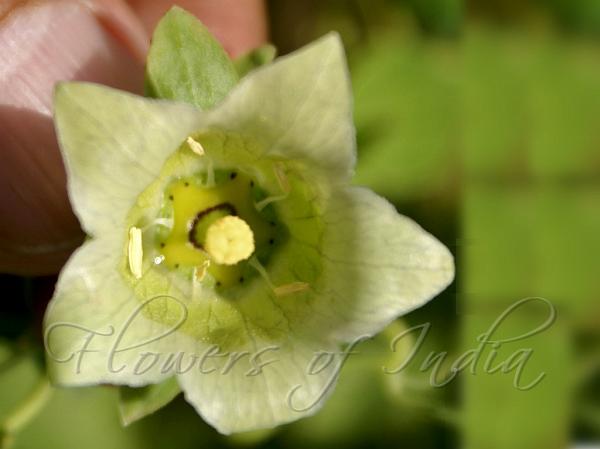|
| Dangshen Bellflower |
|

|

| File size | 95146 |
| Original date | 8/6/11 12:49 PM |
| Resolution | 1024 x 768 |
| Flash | Flash did not fire, auto |
| Focal length | 50.0mm |
| Exposure time | 1/640s |
| Aperture | 5.6 |
| Focus Distance | |
| Metering Mode | Multi-segment |
| Camera make | SONY |
| Camera model | DSLR-A100 |
| Sensor type |
|
|
|
|
Photo: |
Botanical name: Codonopsis pilosula Family: Campanulaceae (Bell flower family)
Synonyms: Codonopsis modesta, Campanumoea pilosula, Codonopsis volubilis
Synonyms: Codonopsis modesta, Campanumoea pilosula, Codonopsis volubilis
Dangshen Bellflower is a twining perennial herb
reaching the length of 5-10 ft with roots 1-3 cm thick. The plant is
shrubby and dense. It produces light green five pointed bell shaped
flowers with prominent yellow or light purple veins. Flowers are
yellow-green, with purple spots inside, broadly bell-shaped, 1.8-2.3 x
1.8-2.5 cm, shallowly lobed. Lobes are triangular, tip pointed.
Filaments are slightly dilated at base, about 5 mm; anthers elongate,
5-6 mm. Stigma is white bristly. Sepal cup is adnate to ovary up to
middle. Sepals are broadly lanceshaped or narrowly oblong, 1.0-2.3 cm x
6-8 mm, margin subentire or sinuate, apex obtuse or acute; sinus
between calyx lobes narrow and pointed. Roots are carrot-shaped or
fusiform-cylindrical, 15-30 x 1-3 cm, often branched. Leaves on main
stems and branches are alternate, those on branchlets opposite.
Leaf-stalks are 0.5-2.5 cm long, sparsely bristly-hairy. Leaves are
gray-green below, green above, ovate or narrowly ovate, 1-7.3 x 0.8-5
cm. Leaf underside is sparsely or densely hairy, rarely hairless, base
is somewhat heart-shaped, rounded, or flat, margin toothed, tip blunt
or pointed.
Medicinal uses:  The roots of Dangshen Bellflower are used in traditional Chinese
medicine. The roots are harvested from the plant during the third or
fourth year of growth and dried prior to sale. The root is also used as
a gentler and more economical substitute for Panax ginseng.
The roots of Dangshen Bellflower are used in traditional Chinese
medicine. The roots are harvested from the plant during the third or
fourth year of growth and dried prior to sale. The root is also used as
a gentler and more economical substitute for Panax ginseng.
 The roots of Dangshen Bellflower are used in traditional Chinese
medicine. The roots are harvested from the plant during the third or
fourth year of growth and dried prior to sale. The root is also used as
a gentler and more economical substitute for Panax ginseng.
The roots of Dangshen Bellflower are used in traditional Chinese
medicine. The roots are harvested from the plant during the third or
fourth year of growth and dried prior to sale. The root is also used as
a gentler and more economical substitute for Panax ginseng.
Identification credit: Gurcharan Singh
| Photographed in Herbal Garden below Cheshmashahi, Srinagar, Kashmir. |